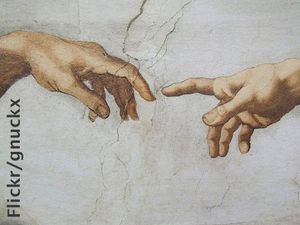Accident or design ?
The moral and scientific dilemmas of Darwinism
Charles Darwin’s centenary in 2009 is double in two senses. He was born two hundred years ago in 1809 and he published his hugely influential book On the origin of species 150 years ago in 1859. The media are set to throw quite a birthday party.
Darwin is rightly feted as the man who changed the way we think about ourselves. His theory that all life forms have arisen by ‘common descent with modification by natural selection’ is now embedded in Western thought as the theory of evolution.
It would be no exaggeration to say that our Western world view today is dominated by an evolutionary outlook or ‘paradigm’ – in which virtually every branch of human experience and knowledge is viewed through evolutionary spectacles.
And that creates a problem, as Raymond Tallis, a leading gerontologist, philosopher and cultural critic has pointed out.
Writing in The Times on 29 October 2008, he shows how evolutionary thinking has high-jacked the science of psychology – so that human behaviour is no longer attributed to moral, intelligent or aesthetic choices but entirely to genetic make-up.
Whether committing crime, choosing food or falling in love, we simply can’t help doing what we do – because it’s all controlled by evolution and the ‘selfish gene’.
Moral responsibility has been declared redundant, and that should be a wake-up call to all thinking people.
Blaming Darwin?
Can we blame Charles Darwin if people today stretch his biological theory to cover all kinds of other things? Yes, I believe so. Darwin was not shy about his all-embracing view of evolution. His book ends with these words:
‘There is a grandeur in this view of life, with its several powers, having been originally breathed into a few forms or into one; and that, whilst this planet has gone cycling on according to the fixed law of gravity, from so simple a beginning endless forms most beautiful and most wonderful have been, and are being, evolved’.
The give-away is Darwin’s ‘view of life’, according to which all living things including man have evolved by natural processes. We are simply superior animals with no more moral responsibility than cows or conifers. Far from being spiritual creatures designed and made ‘in the image of God’, we are a lucky accident of nature.
The struggle for life
The moral implications of Darwinism begin to emerge when we remember that the full title of the 1859 book was, On the origin of species by means of natural selection, or the preservation of favoured races in the struggle for life.
Although by ‘races’ Darwin simply meant ‘varieties’ within any living species, he made no effort to exclude humanity. Indeed, in his later book The descent of man he writes explicitly:
‘At some future period, not very distant as measured by centuries, the civilised races of man will almost certainly exterminate and replace the savage races throughout the world. At the same time the anthropomorphous apes … will no doubt be exterminated.
‘The break between man and his nearest allies will then be wider, for it will intervene between man in a more civilised state, as we may hope, even than the Caucasian, and some ape as low as a baboon, instead of as now between the negro or Australian and the gorilla’. (The descent of man, 2nd edition, New York, A. L. Burt Co., 1874, p.178).
Well, of course, Darwin was wrong. But that has not stopped the Nazis and other totalitarian movements trying to prove him right. And the dilemma is this – we cannot deny the moral implications of Darwinism without undermining the basic tenet of his theory – the survival of the fittest.
If man is, indeed, no more than a superior animal, then there is a blood-chilling logic to such things as abortion, involuntary euthanasia and genocide – quite apart from more mundane matters like trampling others underfoot to attain our own desires.
But fortunately the evolutionary world view is not unchallenged. It faces another huge dilemma – arising from science itself.
The puzzle of life
This challenge stems from the scientific study of the origin of life. It is interesting that after 150 years, and in spite of strenuous efforts by research scientists, no one has been able to offer a scientifically plausible explanation for the origin of life. How the first living entity arose is just as big a mystery as it was in Darwin’s day.
Hopes of finding such an explanation were raised in 1953 when Stanley Miller, a researcher working with American chemist Harold Urey, succeeded in making amino acids (the chemical building blocks of proteins) by passing sparks through gasses thought to have constituted the early earth’s atmosphere.
If the building blocks of life could be created so easily, it was argued, why should they not have collected in some watery ‘primeval soup’ and just linked themselves together in a chain to make the first proteins?
However, further research showed that this was simply not a realistic scenario. For one thing, amino acids cannot join together in the presence of water unless there are some special chemical catalysts also present.
Secondly, a random sequence of amino acids doesn’t make a protein. In order to function in living organisms the chain-like protein molecules have to fold up into highly specialised shapes – shapes that are determined by the precise sequence of amino acids along the length of the molecule.
The ultimate double act
But even if a working protein were accidentally synthesised, it could not reproduce itself (a basic requirement of life) without the help of nucleic acids such as DNA. Where life is concerned, proteins and nucleic acids are ‘partners in crime’ because, on a molecular level, life consists of a complex ‘conspiracy’ between nucleic acids on the one hand and proteins on the other.
The ‘blueprints’ for thousands of different proteins are stored in code on the DNA double helix. A special protein (an enzyme) is needed to split the double helix into its two strands – something that has to happen before the DNA can either reproduce itself or initiate protein synthesis.
The detailed processes are wondrously complex but I only want to make the point that neither proteins nor DNA can reproduce themselves without each other’s help. Theirs is the ultimate double act.
Yet without reproduction there is no life. This is the basic scientific dilemma that precludes the possibility that life began as a chemical accident.
Those who reject the idea of creation by an intelligent Creator argue that science will one day come up with answers to this ‘chicken and egg’ situation. But even if it did, the puzzle of life would still be far from solved.
The genetic code
Even the simplest forms of life are highly complex. This can be illustrated by the genetic code that lies at the basis of life.
Even if random chemistry could somehow assemble a protein or DNA molecule from non-living components, we would not have ‘life’. Why? Because for life to exist these ‘living molecules’ must carry organised information. All known life requires information to be stored on DNA ‘double helix’ molecules.
These molecules resemble a ‘spiral staircase’ bearing chemical groups called ‘bases’. These bases pair together chemically in a special way to form the ‘steps’ on the ‘spiral staircase’, binding the two helical DNA strands together.
There are four possible bases and these act like a four-lettered alphabet which is used to spell out instructions – just as we use the 26 letters of the English alphabet to spell out messages by arranging them in special sequences called words and sentences.
Of course, random letter sequences make nonsense. Only certain arrangements of the 26 symbols make sense. But even so, an infinite number of different messages or instructions can be generated as long as we follow the rules of grammar and syntax.
In the same way, bases strung together randomly along the DNA molecule spell out biological ‘nonsense’. Only certain sequences of the base pairs are biologically meaningful – sequences that encode instructions which the living cell can read, interpret and employ.
This means that it is not the chemistry of DNA that constitutes life but the meaningful information stored by the molecular chemistry, which is an altogether different thing.
This article could be stored in many ways – words printed on paper, magnetic ‘marks’ on a tape, microscopic pits on a CD. The media on which the words are stored are necessary but they are not the information that constitutes the message. The same media could be used to store a meaningless jumble of letters.
Codes don’t just happen
So while it may one day be possible to advance a scientific scenario for the creation of the first DNA molecule, we would still need to explain how the elegant four-letter genetic code came into being and how the ‘letters’ got organised into meaningful instructions for the synthesis of proteins – of which all living things are made.
Codes do not just happen. They are never produced by chance. The only way we know of generating a code – and then of expressing and storing meaningful information using that code – is by employing intelligent thought. An intelligent Creator was at work when life first arose.
And of course, that is by no means the end of the story. The information stored on DNA molecules cannot be used unless there is biological ‘machinery’ available to read the ‘blueprints’ and manufacture the proteins. The only known way for this to happen is via the complex molecular ‘machinery’ found in even the simplest living cell.
Once again, then, we see the unmistakable imprint of intelligence upon the substance of life. Let us be clear – evolution, when adopted as an all-embracing philosophy of life, threatens not only belief in a Creator but also genuine science and human moral responsibility.
Let Darwin’s bi-centenary remind us that accident can explain neither biological nor moral and spiritual life. These can only be consequences of design.
Edgar Andrews
The author, a theoretical physicist, is Emeritus Professor of Materials Science in the University of London.
















